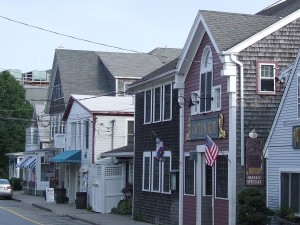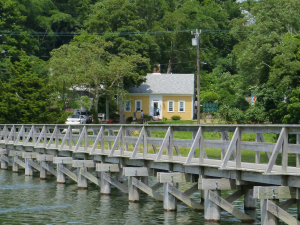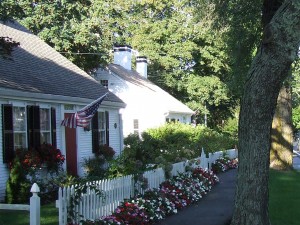Cape towns utilize a wide variety of tools to protect their historic resources. The most commonly used are local historic districts and demolition delay bylaws, though many towns have also adopted more specialized regulations. Some historic resource protections are initiated by town historical commissions, while others are spurred by planning boards, nonprofit historic societies, and neighborhood groups. Key information about tools such as historic inventories and districts is available at the Massachusetts Historical Commission. The Secretary of the Interior’s Standards for Treatment of Historic Properties also offer valuable guidance for work on historic buildings.
Historic Preservation Tools
Inventories
Inventory is an important first step toward protecting a community's historic resources. Historic inventories can be used to teach people about their community's history and to guide town boards in future land use decisions. The Massachusetts Historical Commission (MHC) provides standardized inventory forms for different types of historic resources. The forms are typically filled out by local historical commission members, volunteers, or private consultants, and many Cape towns have sought grants to support this work. Completed forms are kept both in the town and at MHC, which provides online access through its MACRIS database. MHC’s MACRIS maps provides a map-based view of all historic properties in the MACRIS database, allowing you to zoom in on a specific town or neighborhood and click on an inventory point to access its historic inventory form. Some Cape towns have an inventory of heritage landscapes, completed in conjunction with students from Boston University's Preservation Studies Graduate Program and following Massachusetts Department of Conservation and Recreation guidelines. These reports can be viewed from our Projects and Publications page.
Local Historic Districts
Local Historic Districts provide the greatest protection for historic resources. They require review by a historic district commission for any exterior alteration to buildings and structures visible from a public way. On Cape Cod, local historic districts in the towns of Barnstable, Dennis, Eastham, Falmouth, Harwich, Mashpee, and Provincetown operate under Chapter 40C (the Historic Districts Act) of Massachusetts General Law. The town of Chatham established Historic Business districts under special legislation. The Old Kings Highway Regional Historic District, covering portions of Sandwich, Barnstable, Yarmouth, Dennis, Brewster and Orleans, was also created by a special act of legislation.
National Register Buildings & Districts
National Register of Historic Places offers special protection for individual historic buildings and larger historic areas on Cape Cod. Under the Cape Cod Commission Act, demolition or substantial alteration of National Register properties, whether individually listed or a contributing part of a National Register Historic District, are subject to review by the Cape Cod Commission if there is no other historic district protection in place. (See Referring Historic Properties to the Cape Cod Commission for Review.)
Thousands of historic properties on Cape Cod are listed on the National Register of Historic Places. The towns of Barnstable, Brewster, Chatham, Eastham, Falmouth, Harwich, Provincetown, Sandwich, Wellfleet, and Yarmouth all have National Register Historic Districts. Individual National Register properties are also located in Bourne, Dennis, Mashpee, Orleans, and Truro.
Preservation Bylaws
Demolition Delay Bylaws create time to explore alternatives to demolition of historically significant buildings. Any demolition permit request is reviewed by the town's Historical Commission to determine if a building is "preferably preserved" and if a delay period should be imposed. On Cape Cod, delay periods range from 6 to 18 months. See the Cape Cod Commission's Demolition Delay Network.
Zoning Regulations can be crafted to support or provide incentives for historic preservation. Special zoning overlay districts such as Harwich’s Village Commercial Overlay District allows smaller setbacks and mixed uses consistent with historic development patterns. Orleans’ Village Center District and Architectural Review regulations establish design criteria that encourage protection of historic buildings and settings. Other towns allow flexible dimensional standards when historic buildings are preserved, or include special permit criteria to protect historic structures. The Cape Cod Commission's Village Development Model Bylaw guides small-scale, mixed-use development in village centers. It can be established as an overlay district or as a stand-alone zoning district.
Archaeological Resource Districts aim to protect archaeological sites by limiting ground disturbance in sensitive areas. The towns of Barnstable and Brewster protect historic values in their Wetland Protection Bylaws, using Massachusetts Historical Commission review to help determine if an area is likely to have archaeological significance.
Scenic Road Bylaws protect trees, stone walls, and features that fall within the right-of-way of designated roads. A planning board hearing is required prior to repair, maintenance, reconstruction, or paving work if it would involve removal or cutting of trees, or destruction of stone walls within the road right-of-way. It does not address trees or walls on adjacent private property. Barnstable, Falmouth, and Sandwich coordinate their scenic road reviews with the Planning Board, Department of Public Works, Tree Warden, and Historical Commission.
Districts of Critical Planning Concern are a tool created by the Cape Cod Commission Act to protect special resource areas. Towns nominate an area to the Cape Cod Commission and work with Commission staff to craft regulations that protect the district. The Designated DCPCs page describes the Centerville Village, Craigville Beach, and Sandwich Three Ponds DCPC regulations to protect cultural and scenic resources.
Preservation Restrictions
Preservation Restrictions and Conservation Restrictions are legal agreements used to protect historic buildings and lands from change. The restrictions are drawn up by the property owner and a nonprofit preservation group or a government entity who is responsible for their enforcement. Restrictions can be placed on buildings or on land, and may also be used to protect archaeological resources hidden beneath the surface of the land.
The Massachusetts Historical Commission holds Preservation Restrictions on numerous Cape properties that have received preservation grant monies. Preservation Restrictions are required for some projects that use Community Preservation Act (CPA) funding, and many of these restrictions are held by conservation trusts and local historical commissions.
See also the Placing Preservation Restrictions on Historic Resources fact sheet.
Grant Programs that Support Historic Preservation Projects
State Grant Programs
Massachusetts Preservation Projects Fund (MPPF) is a matching-grant program that supports preservation of historic properties owned by municipalities and nonprofit organizations. It is administered by the Massachusetts Historical Commission. MPPF has funded historic renovation or "bricks and mortar" projects in many Cape towns including Provincetown, Yarmouth, Falmouth, and Sandwich. Grants are also available for pre-development projects and acquisition projects. (See the Massachusetts Historical Commission site; 617-727-8470.)
Massachusetts Historical Commission's Survey and Planning Grant is a program available to towns to fund inventories of historic properties and preservation planning efforts. (See the Massachusetts Historical Commission site; 617-727-8470.)
Massachusetts Documentary Heritage Grant Program focuses on the preservation of historic records. It is administered by the Massachusetts Historical Records Advisory Board; contact the State Archivist. (See the Massachusetts Historical Records Advisory Board site; 617-727-2816 ext. 257.)
Massachusetts Foundation for the Humanities offers exhibition grants and media grants that can be used to educate people about historic preservation efforts and significant properties. (See the Mass Humanities site; 413-584-8440 or 617-923-1678.)
Massachusetts Cultural Council offers preservation-related grants through its folk arts and heritage program, and traditional arts apprenticeships program. (See the Massachusetts Cultural Council site; 617-727-3668.)
Massachusetts Historic Rehabilitation Tax Credit provides a tax credit equal to 20 percent of "qualified rehabilitation expenditures" on historic structures listed or eligible for listing on the National Register of Historic Places. This state legislation has been used to support rehabilitation and reuse of historic school buildings in Yarmouth and Bourne. The Massachusetts Historical Commission administers the tax credit. (See the Massachusetts Historical Commission site; 617-727-8470.)
Federal Grant Programs
The National Trust for Historic Preservation offers grants through the Johanna Favrot Fund, the Preservation Services Fund, and others. Eligible grant activities range from consultant services, to design and production of communications materials, to preservation conferences, workshops, and preservation education programs. (See the National Trust for Historic Preservation site; 202-588-6000.)
The National Endowment for the Humanities offers implementation grants for museums and historical organizations; planning grants for museums, libraries and special projects; preservation assistance grants; and grants for stabilizing humanities collections. (See the National Endowment for the Humanities site; 800-NEH-1121 or 202-606-8400.
The Advisory Council for Historic Preservation maintains a site that provides information on historic preservation grant programs. (See the Advisory Council on Historic Preservation site; 202-606-8503.)
Local & Regional Grant Programs
Massachusetts Community Preservation Act (CPA), a state act passed in September 2000, allows towns to adopt up to a 3-percent surcharge on local property taxes to fund historic preservation, open space protection, and affordable housing. A local committee is established to review requests for funding and recommend how funds should be allocated. Decisions are made by town meeting or town council vote. The Community Preservation Coalition maintains a listing of all CPA grants awarded for historic preservation projects across the state (see Mass.gov site).
The Cape Cod Foundation (800-947-2322, 508-790-3040) manages more that 120 individual charitable funds, many of which are set up by donors to address specific issues, including historic preservation and related programs.




